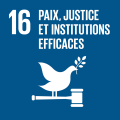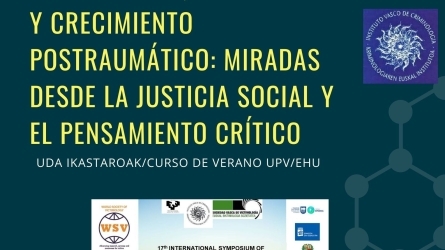
Victimology, resilience and post-traumatic growth: Social justice and critical thought perspectives
Description
This Summer Course will be held face-to-face and there will also be the possibility of participating live online through ZOOM. In the registration process, please select the participation of your choice: face-to-face or live online.
This Course continues the path of the Summer Course celebrated in the past edition of the Summer Courses. It is also part of the work towards the next International Symposium of Victimology (to be celebrated, for the first time in the Basque Country and Spain, from the 5th to the 9th of June, 2022), also organised in collaboration with the UPV/EHU Summer Courses Foundation.
What does it mean for a victim or for an institution or society to be resilient and experiencing posttraumatic growth? Within the pandemic context, and centered in very diverse victimisations and countries, the topics of resilience and posttraumatic growth will be critically analysed to highlight the understanding of the meaning of these concepts, as well as their complexity in the interaction of individual, interpersonal, social and cultural elements. Beyond pathologising or managerial imperatives, this course will explore to what extent that understanding could be done avoiding selecting, banalising and privatising human (individual and social) suffering (as well as harm towards non-human beings), and also restraining from creating secondary victimisation or, in a different way, victimism. Different kinds of victimisation in diverse contexts and countries will be discussed.
Objectives
To debate the different understandings and use of the concepts of resilience and post-traumatic growth across different contexts and countries.
To bring examples of diverse forms of victimisation in different contexts to consider the use of those concepts and the promotion of programs where they can be integrated drawing from victimological research and a critical standpoint.
To exchange ideas among academicians, researchers, practitioners, policymakers and human rights activists, of different backgrounds, geographical origins and generations in all very different fields related to Victimology.
To create future partnerships for the International Symposium of Victimology to be celebrated in Donostia/San Sebastián (5-9 June 2022), engaging local and global civil society.
Activity directed to
- University students
- Students not from university
- Teachers
- Professionals
- All public
- CUALQUIER PERSONA INTERESADA
Contributors
- Dirección de Víctimas y Derechos Humanos del Gobierno Vasco
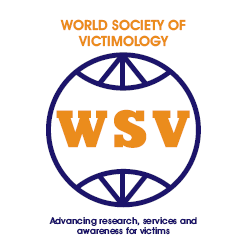
Program
15-07-2021
“Registro“Presentation by the Director of the activity
- Jose Luis de la Cuesta Arzamendi IVAC/KREI - Director
“Los conceptos de resiliencia y crecimiento postraumático a la luz de la pandemia: Una visión crítica de su complejidad desde la Victimología“
- Gemma Maria Varona Martínez IVAC/KREI - Doctora Investigadora Permanente
“Los conceptos de resiliencia y crecimiento postraumático desde la Psicología clínica“
- Enrique Echeburúa Odriozola UPV/EHU - Catedrático de Psicología clínica
“La relación víctima-violencia, una interpelación a la sociedad“
- Manuel Reyes Mate Rupérez CSIC - Doctor Vinculado Ad Honorem Instituto de Filosofía Departamento de Filosofía Teorética y Filosofía Práctica
Round table: “Debate sobre las ponencias anteriores con las personas participantes en el curso“
- Idoia Igartua Laraudogoitia UPV/EHU - Profesora de Derecho Penal (Moderator)
- Gemma Maria Varona Martínez IVAC/KREI - Doctora Investigadora Permanente
- Enrique Echeburúa Odriozola UPV/EHU - Catedrático de Psicología clínica
- Manuel Reyes Mate Rupérez CSIC - Doctor Vinculado Ad Honorem Instituto de Filosofía Departamento de Filosofía Teorética y Filosofía Práctica
Break
Round table: “¿Favorece el sistema penal la resiliencia y el crecimiento postraumático de las víctimas que acuden al mismo? ¿Podemos hablar de sistemas resilientes frente a la creación de victimización secundaria?“
- Idoia Igartua Laraudogoitia UPV/EHU - Profesora de Derecho Penal (Moderator)
- Iñaki Subijana Zunzunegui Tribunal Superior de Justicia TSJ - Presidente
- Josep M. Tamarit Sumalla UOC - Catedrático de Derecho Penal. (PARTICIPA VÍA ZOOM)
- Helena Soleto Muñoz Universidad Carlos III - Catedrática de Derecho procesal
“Debate sobre las ponencias anteriores con las personas participantes en el curso“
- Idoia Igartua Laraudogoitia UPV/EHU - Profesora de Derecho Penal
Round table: “Abusos sexuales y experiencias de victimización en la infancia y la adolescencia desde una perspectiva de resiliencia y crecimientos postraumático“
- Idoia Igartua Laraudogoitia UPV/EHU - Profesora de Derecho Penal (Moderator)
- Cristina Guerrica-Echevarria Estanga UPV/EHU - Psicóloga clínica
- Javier Gómez Zapiain Sociedad Vasca de Victimología/UPV/EHU - Experto y Profesor de Psicología de la Sexualidad
- Mar Gómez Gutiérrez Universidad Complutense de Madrid - Profesora Contratada Doctora en el dpto. de Personalidad, Evaluación y Psicología Clínica. (PARTICIPA VÍA ZOOM)
“Debate sobre las ponencias anteriores con las personas participantes en el curso“
- Idoia Igartua Laraudogoitia UPV/EHU - Profesora de Derecho Penal
16-07-2021
“Resilience in the context of transitIonal justice: critical reflections from South Africa“
- Robert Peacock Peacock Sociedad Mundial de Victimología - Presidente. (PARTICIPA VÍA ZOOM)
“Improvements to justice processes: Are they integral to post-traumatic growth?“
- Michael O'Connell Sociedad Mundial de Victimología - Secretario. . (PARTICIPA VÍA ZOOM)
Round table: “Debate sobre las ponencias anteriores con las personas participantes en el curso“
- Gemma Maria Varona Martínez IVAC/KREI - Doctora Investigadora Permanente (Moderator)
“Violencia de género y empoderamiento“
- Ana Isabel Cerezo Dominguez Universidad de Málaga - Catedrática de Derecho Penal
“Aproximación institucional a la trata de seres humanos: ¿favorece la resiliencia de las víctimas?“
- Carolina Villacampa Universidad de Lleida - Catedrática de derecho penal. (PARTICIPA VÍA ZOOM)
Round table: “Debate sobre las ponencias anteriores con las personas participantes en el curso“
- Idoia Igartua Laraudogoitia UPV/EHU - Profesora de Derecho Penal (Moderator)
Break
“Valor narrativo de la víctima para la resocialización criminal y la reconstrucción comunitaria“
- Myriam Herrera Universidad de Sevilla - Profesora de Derecho Penal. (PARTICIPA VÍA ZOOM)
“Factores de protección individuales, sociales e institucionales ante la victimización de ancianos“
- María Jesús Guardiola Lago Universidad Autónoma de Barcelona - Profesora de Derecho Penal
Round table: “Debate sobre las ponencias anteriores con las personas participantes en el curso“
- Idoia Igartua Laraudogoitia UPV/EHU - Profesora de Derecho Penal (Moderator)
“Post-Traumatic Growth in female survivors of Rwandan genocide“
- Janice Joseph Stockton University - Distinguished Professor of Criminal Justice at Stockton University . (TAKES PART BY ZOOM)
“Evidencing Efficacy of African Victimology Cultural Resilience in Rebuilding Post-Conflict Somaliland“
- Sarah Agnela Simons Frantz Fanon University - Professor and Dean Forensic Psychology and Victimology. (TAKES PART BY ZOOM)
Round table: “Debate sobre las ponencias anteriores con las personas participantes en el curso“
- Gemma Maria Varona Martínez IVAC/KREI - Doctora Investigadora Permanente (Moderator)
Round table: “Mesa sobre los significados del concepto de resiliencia: entre la Psicoterapia y la Ciencia Política“
- Gemma Maria Varona Martínez IVAC/KREI - Doctora Investigadora Permanente (Moderator)
- Raziel Yauri Miranda Doctor en Ciencias Políticas
- Jorge Porras Uribarri Programa Gakoa -IRSE - Psicoterapeuta
- Elisabeth Garmendia Loyarte Criminóloga
Closing session
- Jose Luis de la Cuesta Arzamendi IVAC/KREI - Director
Directors
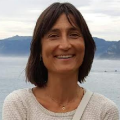
Gemma Maria Varona Martínez
IVAC KREI
Gema Varona is a lecturer in Victimology and Criminal Policy at the University of the Basque Country (UPV/EHU) and senior researcher at the Basque Institute of Criminology (Donostia/San Sebastian, Spain). In 1998 she was honoured with the Junior Scholar Competition Award of the International Society of Criminology for her research comparing restorative justice in Romani and non Romani communities. Former coordinator of the degree in criminology (2013-2017), current coordinator of the UPV/EHU MOOC on Victimology (2016-), and co-director of the Master in Victimology of that University (2014-), she is also the co-editor of the Journal of Victimology/Revista de Victimología. She has authored books on migration and human rights, restorative justice, juries and the construction of the forensic truth, women’s local safety audits, victims of terrorism, and victims of sexual abuse.
Speakers

Ana Isabel Cerezo Dominguez
Universidad de Málaga
(Zaragoza, Spain, 1969) received her M.S. and Ph.D. in Criminal Law and Criminology in 1992 and 1998, respectively, from the University of Malaga (Spain). Since 1993, she joined the Criminal Law Department at the University of Malaga, where she is Full Professor. She was Fulbright Visiting Postdoc at the School of Criminal Justice, Rutgers University, Newark (U.S.) and Visiting Researcher at the Institute of Criminology, Cambridge (U.K.), at the Faculty of Law, Queensland University of Technology, Brisbane (Australia), at the Institute of information Sciences and Electronics, Tsukuba University (Japan) and at the Leuven Institute of Criminology (Belgium). Professor Cerezo is currently Director of Institute of Criminology in University of Malaga, where it will be held the next ESC Conference in September 2022. She has been President of the Spanish Society of Criminology (SEIC) and former member of the European Society of Criminology (ESC).
Obtained his Law Degree at Law Faculty of San Sebastián in1977, being distinguished with the Second Spanish National Prize (Law). In 1979, he equally obtained the High Diploma in Criminology at University Complutense of Madrid. He is Doctor in Law of the University of the Basque Country (1981: Extraordinary Prize of the Law Faculty). He visited several foreign institutions with a post-doctoral research purpose: in France (Université de Pau et des Pays de l'Adour), in the UK (University of Edinburgh), in Belgium (Université Catholique de Louvain), and, particularly, at the Max-Planck Institut (Freiburg, Germany, 1982-1983). Further research visits to DePaul University (Chicago, U.S.A., 1994), and to the Center for Judicial Studies & National Judicial College, University of Reno (2002) can also be underlined. He is Honorary President of the International Association of Penal Law (AIDP), after having served as President from 2004 to 2014.
(Born 1951 in San Sebastián, Spain) has been a Professor of Clinical Psychology at the University of the Basque Country (UPV/EHU) since 1979. He received his B.A. in Psychology from the Complutense University of Madrid in 1973 and his Ph.D. in Psychology from the Complutense University of Madrid in 1978. He was a founder member of the Basque Institute of Criminology in 1978 and he is past president of the Basque Society of Victimology (2004-2008). He has been the director of the research team in Clinical and Health Psychology at the University of the Basque Country since 2011. His publications include more than 530 papers and book chapters, as well as 35 books, mostly in the areas of anxiety disorders, gambling disorder, sexual aggression and violence. His current research is focused on intimate partner violence (psychological treatment of victims and perpetrators) and on violence risk assessment and management, as well as on behavioral addictions.

Elisabeth Garmendia Loyarte
Universidad de Granada
Doctoranda en Criminología, Licenciada en Derecho, Diploma de Estudios Avanzados y Suficiencia Investigadora en Derecho Penal y Política Criminal. Master en Mediación Penal y Experta en Mediación familiar. También he realizado diferentes postgrados en Terapias Humanistas y formación como facilitadora de círculos de paz, diálogo y reparación del daño. En el ámbito laboral, he trabajado durante 13 años en el contexto de la Justicia Juvenil desempeñando el rol de educadora en el Servicio de Medidas en Medio Abierto y como mediadora en ejecución penal tanto con menores como con adultos. También he desempeñado el rol de facilitadora de prácticas restaurativas en el ámbito escolar.

Mar Gómez Gutiérrez
Universidad Complutense de Madrid
Licenciada por la Facultad de Psicología de la Universidad Complutense de Madrid (UCM) en el año 2001 y doctora en Psicología en 2010 por la misma universidad. Su actividad investigadora se centra, desde el año 2003, en una línea de investigación que tiene como objetivo el estudio, evaluación y tratamiento del estrés postraumático en diferentes grupos de población. Esta línea se consolida a través de la participación, como colaboradora e investigadora, en diferentes proyectos de investigación que dan lugar a diferentes publicaciones en revistas científicas indexadas en JCR (9) y reconocidas a nivel internacional, además de libros (3) y capítulos de libros (4).

Javier Gómez Zapiain
Sociedad Vasca de Victimología
Ex Profesor Titular Psicología de la Sexualidad de la Universidad del País Vasco / Euskal Herriko Universitatea. Más información sobre su larga trayectoria investigadora docente y divulgadora en: www.javiergomezzapiain.com/

María Jesús Guardiola Lago
Universidad Autónoma de Barcelona
Licenciada en Derecho por la Universidad de Lleida (2000) y Doctora por la misma Universidad (2005), con sendos premios extraordinarios. Desde 2008 desempeña su actividad académica en la Universidad Autónoma de Barcelona, en el área de Derecho penal y Criminología. Cuenta con más de 30 publicaciones, en materias como: Trata de personas e inmigración clandestina; Justicia restaurativa; Victimología; Medios de comunicación y garantías penales, entre otras. Ha participado en 7 proyectos I+D+i y en otros 6 proyectos de investigación competitivos. Ha realizado diversas estancias de investigación, como en la Université de Liège (Bélgica) -durante dos años-, o en la Università degli Studi di Parma (Italia). Ha sido Magistrada suplente en la Audiencia Provincial de Tarragona (2006) y de Lleida (2012). Forma parte del Equipo de Redacción de la Revista de Victimología y del Consejo de Redacción de la Revista General de Derecho Penal. Es secretaria de la Sociedad Catalana de Victimología.

Cristina Guerrica-Echevarria Estanga
Psicóloga clínica
Licenciada en Psicología por la Universidad del País Vasco, Máster en Terapia de Conducta por la UNED y psicóloga Especialista en Psicología Clínica. Psicóloga clínica en programas orientados al tratamiento de las víctimas de violencia de género y menores víctimas de abuso sexual. Colaboradora y autora de diversas investigaciones y publicaciones sobre violencia familiar y agresiones sexuales. Autora de los libros "Abuso sexual en la infancia. Nuevas perspectivas clínicas y forenses" (2021) y "Abuso sexual en la infancia: víctimas y agresores. Un enfoque clínico" (2000)

Myriam Herrera
Universidad de Sevilla

Idoia Igartua Laraudogoitia
Facultad de Derecho UPV/EHU
Doctora en Derecho Penal por la Universidad del País Vasco. Amplia experiencia profesional en la atención a víctimas de delitos y a la facilitación de procesos restaurativos, como jurista de los Servicios de Cooperación con la Justicia del Gobierno Vasco durante más de dos décadas. En la actualidad profesora del Departamento de Derecho Penal de la UPV/EHU y miembro del Laboratorio de Teoría y Práctica de Justicia Restaurativa.

Janice Joseph
Janice Joseph is a Distinguished Professor of the Criminal Justice Program at Stockton University and presently the Coordinator of the Victimology and Victim Services Minor Program, New Jersey, U.S.A. In 2010, she became the 47th President of the Academy of Criminal Justice Sciences (ACJS), a national criminal justice organization. She has also served as ACJS United Nations NGO representative for over ten year. She was the Chair of the Working Party on Violence Against Women for that International Scientific and Professional Advisory Council (ISPAC) of the United Nations Crime Prevention and Criminal Justice Programme, Milan, Italy. She is presently one of the Vice Presidents of the World Society of Victimology (WSV) and the Chair of the Standards and Norms for that organization. She was also Chair of the UN Liaison Committee of WSV. She is the Editor of the Journal of Ethnicity in Criminal Justice, a scholarly criminal justice journal. Her broad research interests include gangs, juvenile delinquency, female victims, gender-based violence, and minorities and crime. She has over 70 publications and made over 150 professional presentations in more than 28 different countries.

Manuel Reyes Mate Rupérez

Michael O'Connell
AM APM BSocSc MPubPol has a long and distinguished career promoting the rights of victims of crime in Australia, including 12 years as South Australia’s, and Australia’s, first Commissioner for Victims’ Rights, and globally as, among other activities, the Secretary-General, World Society of Victimology and Chair of its United Nations Liaison Committee. Mr O’Connell received the Member of the Order of Australia in 2017 for advancing criminal justice policies and improving outcomes for victims of crime, and he was a finalist for the South Australia Australian of the Year Award. 2020 and 2004. Mr O’Connell has served, and continues to serve, as an expert for inquiries into the rights and/or needs of victims of crime, as well as on international projects such as the UNODC-UNOCT-IPU initiative to draft model legislation to protect victims of terrorism and the UNOCT project on developing guidelines to assist victims of terrorism in Asia-Pacific.
Prof. Dr. Robert Peacock is the President of the World Society of Victimology and Chair of the Department of the Criminology, University of the Free State, South Africa. Since the apartheid years in South Africa, he has been working actively in the field of the Victimology of State Crime. As a NRF-rated scientist he is invited regularly as a visiting professor to different Higher Education institutions across the globe or as a keynote speaker at symposia and conferences. He has been the recipient of a number of academic awards and is the author of several scientific publications. He serves regularly on the boards of scientific committees and editorial boards. Recently, in pursuit of the advancement of an emancipatory African Victimology that is both regionally and globally relevant, Prof Peacock was the editor of the text Victimology in Africa (2019). The work is endorsed by the Desmond and Leah Tutu Legacy Foundation.

Jorge Porras Uribarri
IRSE-EBI
Estudié psicología en la Universidad del País Vasco, he tenido la oportunidad de desarrollar mi experiencia laboral en organizaciones de acción humanitaria en diferentes países y proyectos sociales (España, Chile y Argentina). He desempeñado mi labor realizando intervención clínica individual, grupal y/o comunitaria así como en la dirección y gestión de equipos de trabajo (y voluntariado) multidisciplinares. Tengo formación y experiencia en el abordaje de diferentes realidades, que van desde el trabajo con adolescentes y adultos con consumo problemático de drogas y sus familias, salud mental y SIDA, violencia, ley penal adolescente, personas mayores en situación de vulnerabilidad social y con pacientes oncológicos con enfermedades amenazantes para la vida y sus familias. Desde mi regreso al País Vasco trabajo en el programa GAKOA con hombres condenados por violencia de género para el Servicio Vasco de Gestión de Penas.

Josep M. Tamarit Sumalla
Universitat Oberta de Catalunya
Catedrático de Derecho penal de la Universidad de Lleida desde 1999 y de la Universitat Oberta de Catalunya desde 2010, donde actualmente es director del Master en ciberdelincuencia. Su actividad de investigación se ha centrado en los ámbitos de la victimología, las sanciones penales, la justicia restaurativa y la justicia transicional. Además de los numerosos artículos y contribuciones en obras colectivas, entre sus monografías y obras editadas en los últimos años destacan “La victimización sexual de menores y la respuesta del sistema de justicia penal” (BdF-Edisofer 2017), “El estatuto de las víctimas del delito “(Tirant lo Blanch 2015),” Historical memory and Criminal Justice in Spain “(Intersentia 2013),” La justicia restaurativa: desarrollo y aplicaciones (Comares 2012), “Victimología teórica y aplicada” (Huygens 2013, en coautoría con Noemí Pereda), “Las sanciones penales en Europa (Aranzadi 2009) y”la tragedia y la justicia penal“ (Tirant lo Blanch 2009).

Carolina Villacampa
Universidad de Lleida
Carolina Villacampa is Professor of Criminal Law at the University of Lleida, where she has been teaching Criminal Law, Criminology and Victimilogy since 2002, when she became a senior lecturer at this institution. She is director of the Department of Public Law and of the master's degree in criminal justice system coordinated by this university and taught jointly by four Spanish public universities. For more than a decade, she combined her teaching activity at different Spanish, South American and European Universities with her jurisdictional activity as a substitute Magistrate at the Provincial Criminal Court of Lleida. She acts as a coordinator of the Victimology working group of the Spanish Society of Criminology. She has participated in 19 national and international research projects, having coordinated 5 of them. She has authored or co-authored numerous national and international scientific publications, both in Spanish and English.

Raziel Yauri Miranda
Universidad del País Vasco
Véanse publicaciones en https://ehu.academia.edu/RaziMir

Sarah Agnela Simons
World Society of Victimology
Prof Simons is a member the World Society of Victimology Executive Committee, Chairperson All-Africa Criminal Justice Society and a Focal Point for Stakeholder Engagement for Reviewing the Implementation of UN Convention on Transnational Organized Crime (UNTOC SE4U) and its 3 Protocols (Trafficking in Persons, Smuggling of Migrants & Illicit Firearms). Currently the Dean, Faculty of Psychology & Criminology at Frantz Fanon University in Hargeisa the capital of Somaliland (Somalia). Over forty years’ work experience has included university teaching, administration, project management and research in the field of Education, Gender & Dev, Sustainable Environment and Dev., Criminology and Victimology. As a Crime Investigator and Analysist on Organized Crime, her extensive regional & global work on Victim Assistance, Anti-Human Trafficking & Maritime Piracy initiatives in 15 countries in Africa, Europe & Latin America e.g. www.ungift.org. Promoting African Indigenous Knowledge is crucial.

Helena Soleto Muñoz
Universidad Carlos III de Madrid
Licenciada por la Universidad Complutense (1994), doctora por la Universidad Carlos III de Madrid (2000). Actualmente Profesora Titular del área del Derecho Procesal de la UC3M (2007), Directora del Máster Universitario en Mediación, Negociación y Resolución de Conflictos, del Máster en Justicia Criminal, vocal permanente de la Comisión Nacional de Codificación, Subdirectora del Instituto Alonso Martínez de Justicia y Litigación. Es promotora y directora del Programa de Mediación Intrajudicial en Getafe y Leganés y del programa de mediación Hipotecaria y Vecinal. Asesora del Colegio de Abogados de Madrid en materia de Derecho Colaborativo y miembro del Consejo de Administración de la Asociación internacional GEMME (European Group Magistrates for Mediation). Además de la docencia en la Universidad Carlos III y otras universidades españolas ha sido profesora invitada en Université Paris X Nanterre y visiting scholar en Harvard Law School. Directora de varios proyectos nacionales y eu
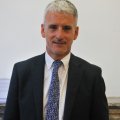
Iñaki Subijana Zunzunegui
Tribunal Superior de Justicia del País Vasco, Presidente
Magistrado y Fiscal en excedencia. Ingresó en la carrera judicial en 1990, con primer destino judicial eb el juzgado de primera instancia e instrucción 1 de Azpeitia, en la provincia de Gipuzkoa. Tras ascender a magistrado, pasó la Audiencia Provincial de Cádiz (1992 y 1995). Sus siguientes destinos fueron ya en San Sebastián: juzgado de primera instancia 5 y juzgado de lo penal 2. En 2001 pasó a la sección primera de la Audiencia Provincial de Gipuzkoa. Presidió la Audiencia Provincial de Gipuzkoa desde septiembre de 2010 a abril 2021. En 2004 obtuvo el Doctorado en Derecho Penal por la UPV/EHU y en 2015 ha obtenido el título de Mediador que otorga la Fundación Notarial SIGNUM. Tiene reconocida la especialización en Derecho Civil especial o foral propio de la CAPV. Tutor externo del Practicum del Grado de Derecho en la UPV/EHU y profesor del Instituto Vasco de Criminología. Actualmente es Presidente del Tribunal Superior de Justicia del País Vasco, desde abril 2021.
Summary
Conclusions sent by the direction of the Summer Course
Sustainable development goals
Agenda 2030 is the new international development agenda approved in September 2015 by the United Nations. This agenda aims to be an instrument to favour sustainable human development all over the planet, and its main pillars are the eradication of poverty, a reduction in equality and vulnerability and fostering sustainability. It is a unique opportunity to transform the world up to 2030 and guarantee human rights for all.

16 - Peace, justice and strong institutions
Foster peaceful and inclusive societies for sustainable development, facilitate access to justice for everyone and construct efficient and inclusive institutions that are accountable at all levels. Key issues: a reduction in violence, mistreatment and exploitation, the rule of law, equal access to justice, a reduction in corruption and bribery, efficient and transparent institutions, participation, access to information, protection of fundamental freedoms.
More information